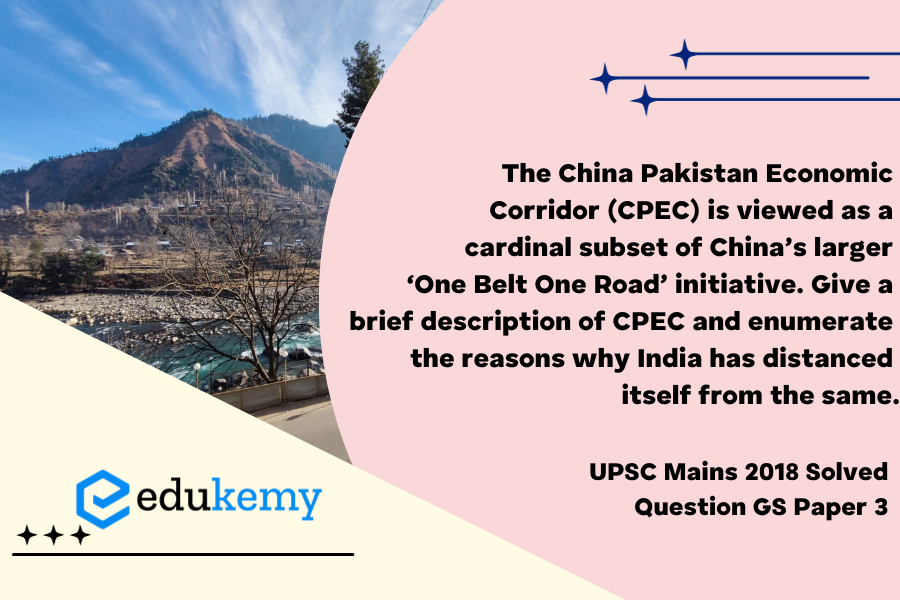The China-Pakistan Economic Corridor (CPEC) stands as a pivotal component within China’s expansive ‘One Belt One Road’ (OBOR) initiative, emblematic of the deepening economic ties between China and Pakistan. Spanning infrastructure projects, energy ventures, and economic cooperation, CPEC aims to create a corridor connecting the Gwadar Port in southwestern Pakistan to China’s northwestern region, Xinjiang. Despite the ambitious regional connectivity goals, India has chosen to distance itself from CPEC for multifaceted reasons. Firstly, India raises concerns over the project’s alignment through the Pakistan-administered territory of Gilgit-Baltistan, which it views as a violation of its sovereignty. Additionally, India contends that the corridor undermines regional stability by passing through the disputed territory of Kashmir. Geopolitical tensions between India and Pakistan further complicate India’s engagement with CPEC, reflecting the intricate web of political and territorial considerations that shape regional dynamics.
Tag: Role of external state and non-state actors in creating internal security challenges. Challenges to internal security through communication networks.
Contents
Decoding the Question:
- In the introduction, write briefly about the BRI project.
- In Body,
- Discuss the significance of CPEC for both China and Pakistan.
- Write briefly about CPEC and reasons behind India’s distancing itself from the same.
- Conclude with writing about sovereignty of India and India’s own connectivity projects in the region.
Answer:
In ancient times, the Chinese used to trade with India, Arabia, Persia, Rome and other Mediterranean nations using a land route known as ‘the silk road’. The aim of China’s One Belt One Road (OBOR) project is to create an economic land belt and a maritime link to redirect Chinese capital to develop infrastructure of various countries in Asia, Europe, and Africa, and thereby expand Chinese influence over these countries.
The China-Pakistan Economic Corridor (CPEC) is a massive bilateral project which aims to improve infrastructure within Pakistan for better trade with China. It was launched in 2015 with an investment of $47billion. It is a major subset of China’s larger One Belt One Road (OBOR/BRI) initiative.

Significance of CPEC for both China and Pakistan:
- Infrastructure development: CPEC is mainly focussed on building railways lines, roadways, and gas pipelines to develop China’s western province Xinjiang. It will also help Pakistan to improve infrastructure and improve connectivity.
- Avoid Indian ocean and strait of Malacca: Most significant use of this CPEC is to avoid full movement across Indian Ocean and strait of Malacca. As in case of any conflict with India, China can choke China in the Indian ocean by creating barriers at Malacca strait.
- Shortest route: CPEC will open the shortest and more accessible route for China to oil rich countries, African continent, Central and European countries etc.
- Improve connectivity: China’s ambitious BRI project is focussed on connecting all the continents except Antarctica. CPEC is one of the parts of it. Building infrastructure will help China to increase its footprint in global economic diplomacy.
India has openly expressed it displeasure over CPEC due to following reasons: India has been looking at CPEC as a military threat and whether it is being built for economic or for military purposes is still a matter of concern in India’s diplomatic arena:
- Sovereignty: The project passes through Gilgit-Baltistan in PoK, which belongs to India but illegally occupied by Pakistan.Further, Pakistan illegally ceded over 5000 square kms of India’s territory in this region to China under China-Pakistan boundary agreement (1963).
- Against International norms: India’s view is that the project is little more than a colonial enterprise, leaving debt and broken communities.
- Unsustainable debt burden: The Indian statement contains the sentiment that connectivity initiatives must follow principles of financial responsibility to avoid projects that would create an unsustainable debt burden for communities.
- No Connectivity for India: CPEC doesn’t give India an access to Afghanistan or Central Asia through Pakistan, because that’ll require signing additional pacts but Pakistan’s Military-Jihadi complex may not let it materialize. Even the proposed TAPI Gas pipeline from Turkmenistan to India via Afghanistan and Pakistan is also not finished on time due to the obstinate nature of the same state and non-state actors in Pakistan.
- India’s own initiatives: India is looking forward with partners like Russia to complete the International North-South transport corridor, regional connectivity projects in South Asia, SAGAR initiative, etc.
- Environmental Concerns: It may disrupt and destroy Himalayan Ecology.
India’s official position: CPEC passes through Pakistan Occupied Kashmir (PoK), which belongs to India.Yet, China has not shown any understanding of India’s sovereign claims and therefore India will not be part of the CPEC or OBOR.
Conclusion
Thus, since its beginning India has been suspicious of CPEC due to lack of clarity. India’s territorial integrity and sovereignty is utmost most important as against economic interest and now it is high time that India should posture its stand on BRI and CPEC openly and balance China with the help of friendly countries.
In case you still have your doubts, contact us on 9811333901.
For UPSC Prelims Resources, Click here
For Daily Updates and Study Material:
Join our Telegram Channel – Edukemy for IAS
- 1. Learn through Videos – here
- 2. Be Exam Ready by Practicing Daily MCQs – here
- 3. Daily Newsletter – Get all your Current Affairs Covered – here
- 4. Mains Answer Writing Practice – here


